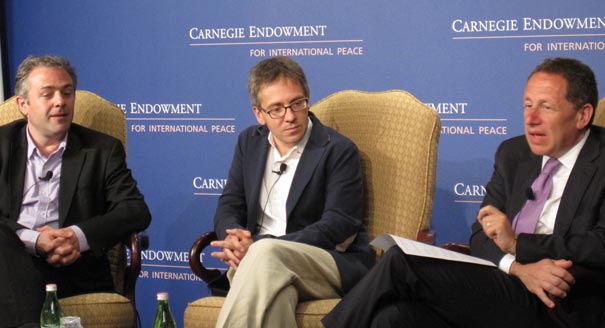Registration
You will receive an email confirming your registration.
Edward Luce and Ian Bremmer debated America’s changing role in the world given profound social, economic, and political challenges, as well as the geopolitical consequences. Luce’s new book, Time to Start Thinking: America in the Age of Descent, outlines the nation’s decline and the loss of its pragmatism; Bremmer’s book, Every Nation for Itself: Winners and Losers in a G-Zero World, details the risks and opportunities in a world without global leadership. Carnegie’s David Rothkopf moderated.
A Brand New World
One of the most powerful trends of modern times is the “Great Convergence,” Luce said. He described this as the rise of the developing world which was previously excluded from the club of growth. By 2050, worldwide growth trends are likely to be much more representative of population size, even as U.S. share of global GDP will continue to slide. Luce argued that this phenomenon is both inevitable and largely positive.
Bremmer agreed with Luce’s assessment, adding that this change should not be viewed as the rise of the “rest” of the world with the West as a whole having already risen; instead, it is the rise of “others,” countries that simply share different views from the West on most global issues. He argued that ultimately, the combination of vanishing power differentials and the lack of unified leadership among the “other” rising powers is leading to a G-Zero world, where global leadership is largely absent.
The Decline of the United States?
Luce and Bremmer debated whether the United States was declining in a G-Zero world:
- Absolute Decline: Luce argued that the first U.S. priority should be rebuilding its economy. Yet despite the urgency of this task, he stated that Washington’s ability to make policy has deteriorated, triggering a negative feedback loop that makes reform progressively more and more difficult. Luce said that it is very clear as to what the United States should be doing, but it is less clear as to how it will do it. As a result, the United States is entering an age of limitations.
- The United States in the International Context: Rothkopf noted that the United States may find itself increasingly compelled to turn away from the outside world. Bremmer agreed , noting that a large segment of the American population harbors isolationist sentiments. Broadly speaking, he said, the United States suffers from the “safe haven curse”: as the world becomes increasingly unstable, the United States is only marginally affected, so it has little impetus or urgency to act quickly to resolve the problem. Additionally, Luce pointed out that the United States is less able to persuade others in the world today because it is no longer taken as seriously.
- Relative Rise: Bremmer argued that it is important to make a distinction between absolute and relative decline. While it is true that the United States is doing less well than it was two decades ago, he noted that the world is generally becoming increasingly turbulent and unstable. As a result, other countries are also increasingly facing challenges, but in comparison to the United States and its “safe haven,” those challenges much more directly impact other countries. Ultimately, the United States is the “least bad” of a world that is performing poorly; it may be in absolute decline in comparison to past standards, but it is gaining relative strength in a world that is declining even faster, he concluded. Bremmer added that while the United States has less proactive credibility, it is operating in a world system that needs it much more than it used to.
The United States and China
- China Rising: China has historically proven that it is very adaptable and can intelligently manage its rise, Luce said, suggesting that China’s growth is likely to continue at high rates. He noted that China is already gaining both economic and diplomatic power as a result. While human rights dissidents may come to the American embassy in China, when countries want economic loans, they go to the Chinese embassy now. Luce argued that while the conventional wisdom suggests that the United States will be predominant for some time, there is reason to believe that the United States may be declining much quicker relative to China than official statistics would suggest.
- China in Decline: Bremmer disagreed, noting that China faces major difficulties. He argued that its economic outlook was highly volatile, in part because it must confront vastly more problematic domestic challenges than the United States. As one example, Bremmer pointed to the demographic crunch facing China in 2018-2020 that will force it to move into a consumption-led model of economic growth. China must change in order to continue growing, but that change will increasingly oppose the individual interests of China’s elite, he concluded.
Bremmer noted that both he and Luce agreed that the United States’ trajectory was not promising. However, relative to China as well as the rest of the world, the United States’ political resilience is so high that it will better be able to withstand the vicissitudes of a G-Zero world. Rather than having the problems most people think, the U.S. governance structure is purposefully designed to only allow incremental change (save for crisis situations). Because Washington does not see any major crises on its hands in any real sense, it is acting with little urgency. Bremmer concluded by arguing that in a risky world, growth matters less than political stability, and the United States still reigns supreme under this standard when compared to its nearest competitors.
